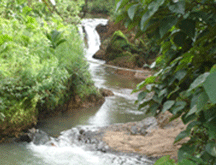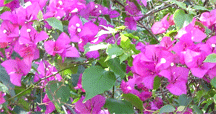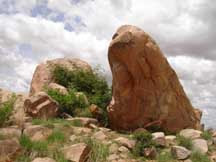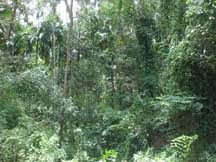Friday, October 19, 2007
Seven principles of life
1. The World Is What You Think It Is.
2. There are no limits.
3. Energy Flows Where Attention Goes.
4. Now Is The Moment Of Power.
5. To Love Is To Be Happy With (someone or something).
6. All Power Comes From Within.
7. Effectiveness Is The Measure Of Truth.
Sunday, September 2, 2007
Come out of depression
Depression may be temporary of short duration that passes off unnoticed or may be nagging longer duration. Enduring depression may be your own creation as result of brooding over whatever sour thing that happened around you and deeply affected you. Prolonged depression decreases your energy level and reduces your potential to achieve optimum results.
First you have to realize that you are depressed and recognize the necessity to save yourself by coming out of it. If you simply sympathizes with your self apologetically, or silently suffer or masochistically enjoy your depression, it is more likely you would not come out it easily. You may lead yourself to further unpleasant complications.
Next step would be to change your routine style of functioning for sometimes at least so that you shall forget the images that bruises your mind and thereby get rid of depression. Change of place or environment may helpful in many cases. Or change the usual style of attending to your work or alter the timings for a few days till you invigorate yourself. Mix up with pleasant and selfless friends. Try to enjoy some harmless jokes with your friends.
Volunteer yourself for some selfless social service activities and engage in it wholeheartedly.
Try to be like an innocent child that enjoys pondering over various small and minor things. Possibly because of your own depression you have forgotten to see around yourself or totally oblivious of the beauty and charm of the nature around you. Take pleasure in observing minor aspects of nature intently and unassumingly like a small child. Bathe in the healing powers of the fresh air, the greenery, the expansiveness, the warmth and the pleasantness the nature bestows upon you.
Thursday, August 23, 2007
The importance of Relaxation
Therefore it is important and mandatory that you should expel all feelings of built in stress and strain in your mind and body and get yourself into a pleasant and cheerful mood before you embark on the breathing exercises.
Under such optimum conditions only, the ‘foul air’ or the carbon dioxide accumulated in the myriad cells of your body systematically gets expelled and the rejuvenating oxygen- rich fresh air fills up its place.
Wednesday, April 18, 2007
Art of breathing
Breathing is a natural but essential phenomenon in animals designed to supply a fresh dose of oxygen to the body and the mind and at the same time, remove the carbon dioxide accumulated inside the body. However, it is such a simple process that in the course of our routine life, with its usual dosage of ups and downs, we often tend to take the importance of this natural process for granted.
Breathing is absolutely an art and it should not only be cultivated properly and practiced regularly but also be remembered again and again when we tend to disregard or forget it.
Pranayama is a systematic approach to the process of breathing. The oxygen we intake with breathing in is credited with the title of praaNa, the life. Thus, it defines and explains the importance of breathing in a nutshell.
The art of breathing is divided into two parts: Uchvasa, the breathing in and Nishvasa, the breathing out. The pranayama regulates you to breathe in slowly and steadily till your lungs are filled with the fresh air. You are supposed to keep that inhaled quantity of fresh air for some comfortable duration of time. This ensures that the fresh air you sucked in is distributed to various parts of your body including the brain; and simultaneously all the stale air (carbon dioxide) is collected back to the lungs. And then, when you slowly breathe out, the accumulated carbon dioxide is released to the outer world, the atmosphere. The breathing exercise is repeated for several cycles of inhaling and exhaling.
Thus, the art of pranayama is a systematized method to regulate distribution of (oxygen rich) fresh air to various parts of the body and at the same time extricate (carbon dioxide rich) stale air out of the body. The supply of fresh air to the body and mind ensures a fresh lease of energy that invigorates your actions. Similarly, the removal of stale air from the body increases your comfort levels and soothes your reactions.The art of breathing simply changes the way you live and react to the world.
Well, there is nothing new, we all know it, you may say! Yes. It is true that we all, or at least most of us, know about the pranayama, thanks to the teachings of various Swamis and Rishis in our society from time to time.
But, the fact is that the art of breathing is such a simple unassuming natural exercise that we tend to disregard it with passage of time and preoccupation with our joys or miseries. We neglect the art leading to lack of energy, motivation or direction and above all poor status of physical and mental health.
Therefore the message is reactivate yourself if you are down in energy, proper spirits or health. Remember the ancient art of breathing and start practicing it.
And if you had taken quite a long break from the art of breathing, start with cleaning your internal system: begin with exhaling the stale air accumulated in your body and mind. Then continue with systematic breathing in and out comfortably. See the physiological and psychological changes for yourself.
Tuesday, April 17, 2007
Vegetarianism
It has been generally considered that the early prehistoric man was a meat eater. He learnt from carnivorous animals that meat of other animals can be consumed as food. He must have eaten raw meat in the beginning like animals. Sooner he also found that some animals also survive on grass, leaves, fruits and tubers. He must have realized that this is a more sober way of quenching the hunger than hunting and eating other animals. After he learnt the art of cooking food, as well as the agriculture, he had ample choices among meat and vegetarian food and combination of the two types.
In the last million years, the man has evolved in several directions. As far as the preference of food is concerned, I think the basic attitude of the individual mattered most. Those societies with ebullient, rash and raw habits went after the meats and those with considerate attitudes who felt humane towards other animals preferred and adopted vegetarian way of life. According to many opinions, even the Vedic communities, considered to be about 1700 BC old, were a meat eating groups by general choice.
Thus, vegetarianism is a way of life by choice, like Mahatma Gandhi’s ahimsa or nonviolence. And with hundreds of years of practice of vegetarianism we have found that it is better and safer way of living style than that of meat eaters who are generally more prone towards cholesterol related problems.
But human attitude is a peculiar thing. It can often be biased, chauvinistic or partisan. It can conveniently forget the original principle driving behind a life style.
I read an interesting article on vegetarianism today. The author cautioned vegetarians about foreign chocolates and sweet meats that may contain, obviously, very small amounts of non-vegetarian material. Cakes should be avoided, he advised because they may contain products of egg. He said that even the unfertilized farm eggs, which many people advocate as vegetarian food should be classified as non-vegetarian food. Some scientist has reported that these eggs require oxygen for growth. Since it consumes oxygen while growing, it should be treated as living animal and should be shunned by vegetarians!
At this point I stopped here, to breathe my quota of oxygen! What a great thought! The gentleman thinks that a farm egg should be classified as non-vegetarian food since it consumes oxygen for growth!
I felt shocked at his discrimination but consoled myself that he may not be aware of the fact that all plants, the basic stuff of vegetarians, are also living beings which breathe and grow like animals. He thinks that a farm egg is a living being but is ignorant that all those vegetables, fruits and potatoes also contain living and breathing cells!
But this is nothing; I consoled myself, compared to certain individuals who carry vegetarianism to the extremes. These vegetarian extremists avoid onion, garlic and some other vegetables, possibly under the pretext that they were introduced by foreigners! Probably these extremists are not aware that most of our vegetables including the ubiquitous chili are introduced by the Portuguese only five decades ago.







